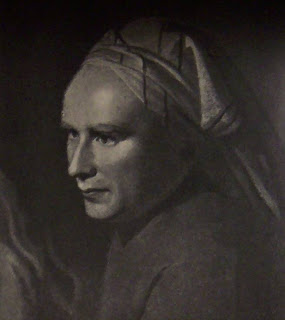Four novels:
Psmith, journalist by P. G. Wodehouse 5th - 18th February
I think this will be the 15th Wodehouse book I've read. He wrote 96 of them, so if I read two a year, I'll have read the entire Wodehouse canon by the time I'm 75.
 The Heir of Redclyffe by Charlotte Yonge
The Heir of Redclyffe by Charlotte YongeAbraham Kuyper's fiancée gave him this book to read in an attempt to convert him to orthodox Christianity.
Ivanhoe by Sir Walter Scott
The 1952 film version of this was one of my favourite movies when I was young, but I never got around to reading the book.
Children of Hurin by J. R. R. Tolkien
Four books of theology or Biblical studies:
 The Handwriting on the Wall by James B. Jordan 3rd January - 14th April
The Handwriting on the Wall by James B. Jordan 3rd January - 14th AprilThis is a commentary on Daniel by one of my favourite authors. In Semester 1, 2011, I will be helping to teach a subject at PTC on the Book of Daniel, so this will be good preparation.
Sola Scriptura by Keith Mathison
The Auburn Avenue Theology: Pros & Cons, edited by E. Calvin Beisner 19th June - 28th August
The so-called Federal Vision used to be known as the "Auburn Avenue Theology," from a conference held at Auburn Avenue Presbyterian Church in Monroe, Louisiana. This book is a colloquium of writers for and against the perspective. It was published in 2004, at a time when people on both sides of the controversy were still talking to and listening to each other.
Canon And Biblical Interpretation, edited by Craig G. Bartholomew et al 4th September - 7th December
In the middle of 2010 I started a Doctor of Theology degree, looking at the portrayal of women in the Book of Samuel. I need to think deeply about my methodology, which will involve a canonical approach. That is to say, my thesis will be focusing on the Book of Samuel as a unity - not I and II Samuel, not spilling over into 1 Kings (though Bathsheba appears there as well). It will also examine the final form of the Masoretic Text. So I will need to work through issues relating to canon, and I trust that this book will help me do so.
Four books to help me in my work as a pastor:
I read a book on this topic back in May: Quitting Church by Julia Duin. But I think the perspective will be somewhat different.
The Pastor as Minor Poet: Texts and Subtexts in the Ministerial Life by M. Craig Barnes 6th March - 21st March
Exploring Worship: A Practical Guide to Praise & Worship by Bob Sorge 20th November - 29th December
This book is written from a charismatic perspective, but I still think reading it will help me think through aspects of public worship. I am inescapably a worship leader - the only thing is whether I do this well or poorly.
Why Johnny Can't Preach by T. David Gordon 9th - 12th January
Four more Christian books:
Pagan Christianity?: Exploring the Roots of Our Church Practices by Frank Viola and George Barna
This is a follow-up to one of my favourite books: Finding God at Harvard.
Black and Tan by Douglas Wilson 11th - 16th February
Mudhouse Sabbath by Lauren Winner 1st - 11th January
I do like Lauren Winner, especially her autobiographical Girl Meets God.
Four other books:
I must have been a teenager when I obtained a coin of Rudolf II. So it's about time that I learned about the man.
1421: The Year China Discovered America by Gavin Menzies
In Xanadu by William Dalrymple 14th June - 14th July
I love Dalrymple's From the Holy Mountain, where he relates his travels in the Middle East. It looks like here he does the same thing with central Asia, re-tracing the route Marco Polo took from Jerusalem to China.
Seven Pillars of Wisdom by T. E. Lawrence















